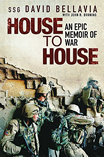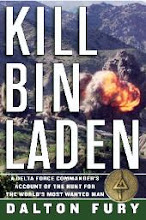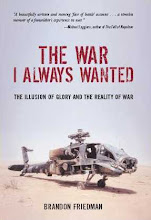I've read a number of books on the Iraq War, from soliders' memoirs to journalists' observations. "How to Break a Terrorist" stands alone from that group, and is it gives an inside look into specific tactics on the most personal level.
I can see why the book ruffled some feathers--it is a complete rejection of the ways of old, and the new methods expressed in it could certainly raise some eyebrows. Creating relationships and developing mutual respect seems counter intuitive when dealing with mass murders. Why show people respect who would just as easily blow you up as they would sit in a room with you? And indeed, the author's inner turmoil over this point, combined with his persistent dedication to the cause (nailing Al Zarqawi) and trust in new methods of interrogation, is one of the more compelling subplots of the book.
The characters we meet are fascinating. I won't talk too much about that, because you should read about them yourself, but the men he interrogates are all distinctly different, and the methods he uses change based on the subject, from the street peddlers up to the final link to Al Zarqawi, whose breaking requires the most creative interrogation tactic of all.
To make it even more interesting, the new methods aren't even entirely accepted by the other members of the interrogation team, who prefer control tactics instead--the office politics--set in a warzone--remind us that old ways die hard. Also, as someone who only has a view of the military from the outside (so far, at least--that could change in the coming years), I was surprised to read about the structure of the interrogation unit. Matthew is a major, but his rank doesn't matter--one of the funnier exchanges comes within the books first few pages, when an NCO asks him if he'll have a "hard f*%$ing time" with a sergeant giving him orders. Nearly everyone is an equal in this endeavor.
Beyond the interrogation and workrooms, though, the author also makes a poignant commentary on the conflict itself: many Sunni join Al-Qaida out of economic and security reasons, and not because they care too much about the cause or are particularly fanatical. It's a decision to maintain the livelihoods of them and their families. By building good relations with the Sunni and presenting an alternative to joining Al-Qaida, the author posits, we can better go about creating a strong Iraq (he is vindicated--and I don't think this gives anything away--by some of Petraeus's later initiatives that do exactly that).
The author manages to convey his message about the effectiveness of the new, psychological interrogation methods without sounding preachy. He mentions torture sparingly, and focuses on why his ways work far more than on why others don't. Unlike other Iraq commentaries I've read, he doesn't have an ulterior agenda, and isn't out to get anyone, destroy careers, or anything even close to that. The DoD censures a good chunk of lines in the book, and yet, besides some exasperation linked to the aforementioned office politics, he never once says anything bad about his command--that's quite admirable, IMO.
skip to main |
skip to sidebar

At one point the reward was $25 million, but Coalition Forces dropped it to $10 million.

Air Force F-16s dropped the bombs.



June 7th, 2006

The news of Zarqawi's death was celebrated across Iraq (courtesy AP Images).

Carried out by Zarqawi's associate, this bombing incited the civil war between Sunni and Shia (courtesy AP Images).

The Egyptian, he was Zarqawi's right hand man and is now the leader of Al Qaida in Iraq.

Zarqawi's Spiritual Advisor.
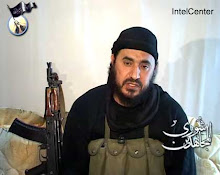
Zarqawi delivering a sermon. This was the last video of him before his death.
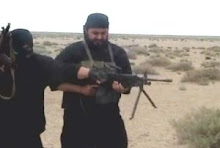
Unable to reload his weapon.

Major General Caldwell informing the press of Zarqawi's death.
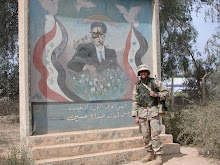
April 2003, just short of "mission accomplished."
By Matthew Alexander
Interview with Paul Harris on KTRS
"The things that make you a good American are the same things that make you a good interrogator."
-- Matthew Alexander
-- Matthew Alexander
World War II Interrogators
Contact the Author
I'll take your questions at:
howtobreakaterrorist@
gmail.com
I'll post responses here on the blog.
howtobreakaterrorist@
gmail.com
I'll post responses here on the blog.
How to Break a Terrorist was co-authored by John R. Bruning with a Preface by Mark Bowden, author of Black Hawk Down and Killing Pablo.
Order from:
Reward Poster

At one point the reward was $25 million, but Coalition Forces dropped it to $10 million.
The Airstrike

Air Force F-16s dropped the bombs.


Deceased Zarqawi

June 7th, 2006
Iraqi Soldiers Celebrating.

The news of Zarqawi's death was celebrated across Iraq (courtesy AP Images).
The Golden Dome Mosque

Carried out by Zarqawi's associate, this bombing incited the civil war between Sunni and Shia (courtesy AP Images).
Abu Ayyub al Masri

The Egyptian, he was Zarqawi's right hand man and is now the leader of Al Qaida in Iraq.
Sheikh Abu Abd' al Rahman

Zarqawi's Spiritual Advisor.
Preacher of Hate

Zarqawi delivering a sermon. This was the last video of him before his death.
Zarqawi

Unable to reload his weapon.
Press Release

Major General Caldwell informing the press of Zarqawi's death.
Baghdad International Airport

April 2003, just short of "mission accomplished."
Recommended Reading
Click on the book images below to read about these books.
About the Authors
- Matthew Alexander
- Matthew Alexander has served for over eighteen years in the U.S. Air Force and Air Force Reserves. As the leader of an elite interrogations team in Iraq, he conducted or supervised more than 1,300 interrogations. He is a veteran of three wars and was awarded the Bronze Star Medal in 2006 for his achievements in Iraq, including leading the interrogations that led to the killing of Abu Musab Al Zarqawi, the notorious Al Qaeda leader.


